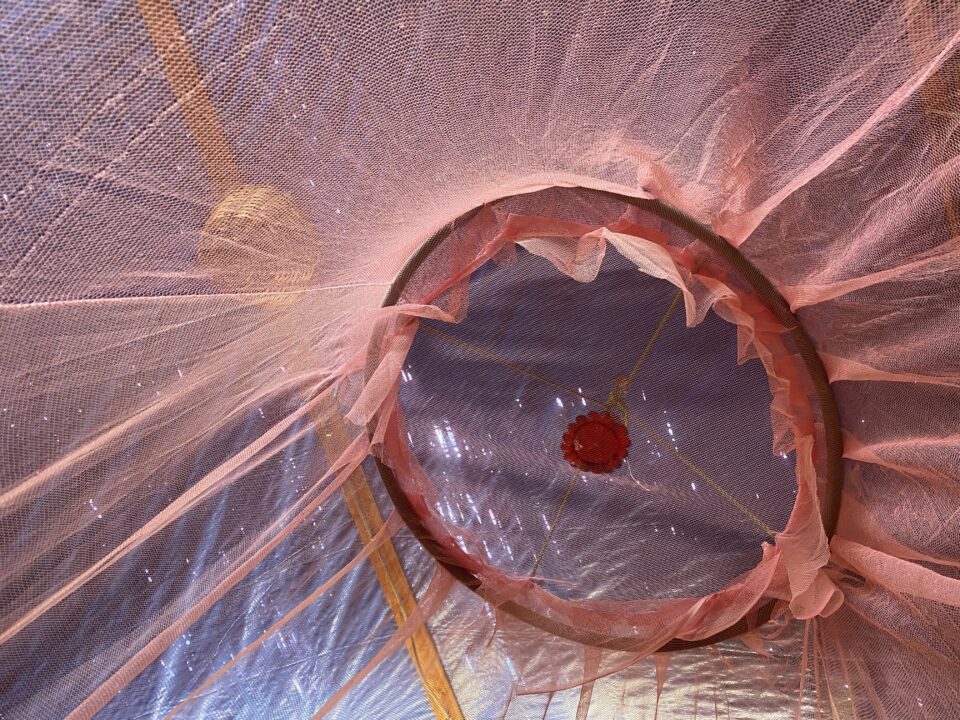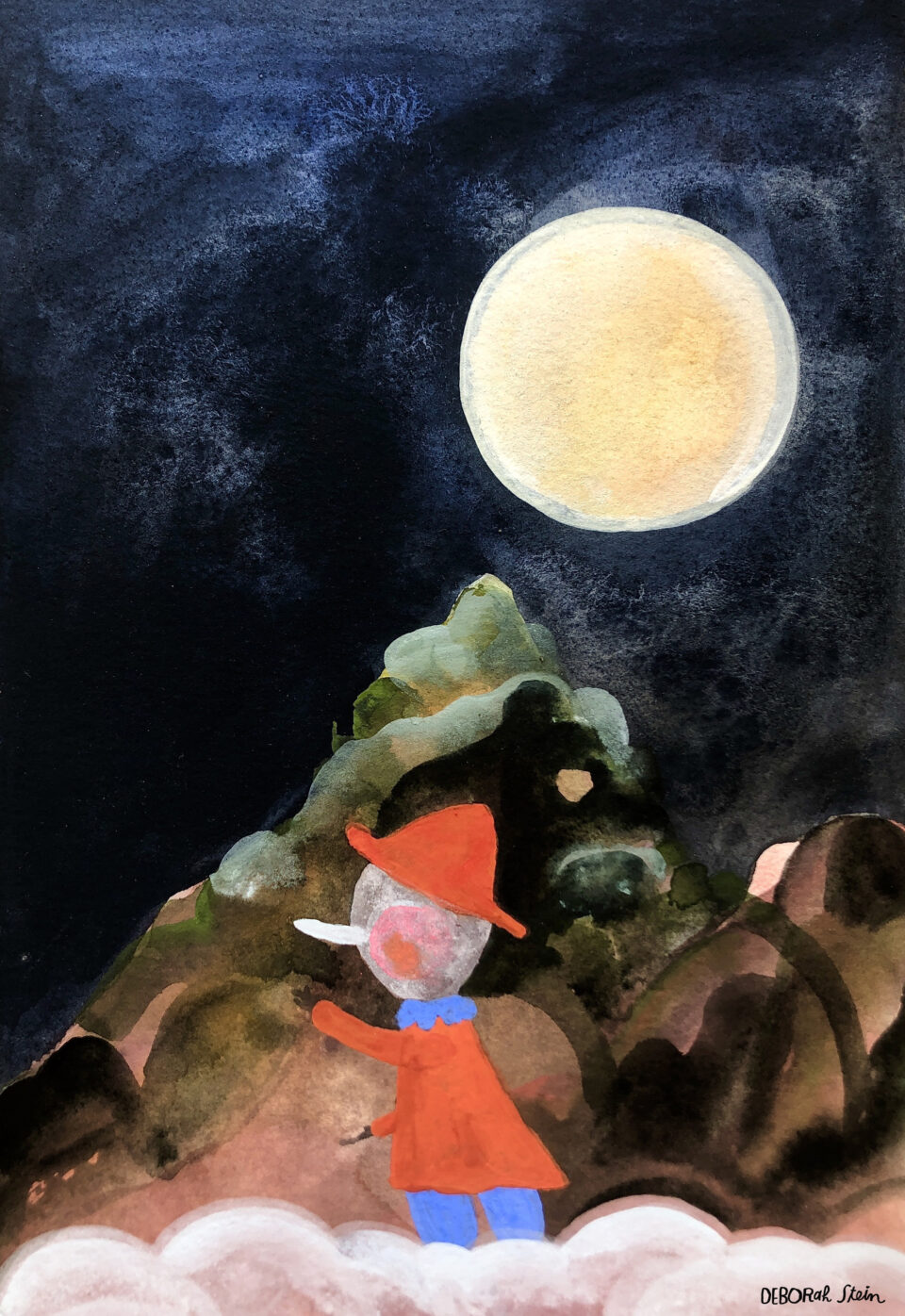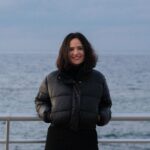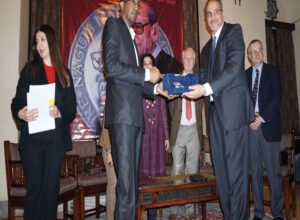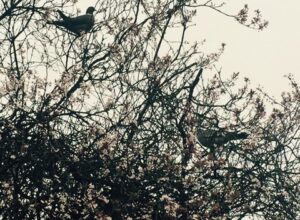August 2020. Everything feels ungraspable. We’re all on the rooftop of a Hamra building, the city underneath us a collapsed deck of cards. Music plays from the little red speaker. Smoke swirls into the sky, there’s a stench of bodies and arak. I’m not sure why we’re here – to celebrate surviving? To alleviate the guilt of it? To mourn what will never return? Share the ache, the nightmares? I ask Leila the questions. We go through the motions with our friends – sing to each other, dance, drink, eat. There’s no expectation of answers. We just want to try and find the familiar, latch onto it. We want to learn what it means to sit together in incomprehensible grief.
Except something isn’t right in my head. Of course. But the sensation intensifies as the night progresses. There’s no sense of boundaries between me and my friends and the external world, as though I can stride into heads without permission. It doesn’t feel divine, or interesting. Everything spins around in slow motion then faster and back again. Why did I survive, while dozens and dozens didn’t? Where do we go with what we’ve seen? How are we allowed to dance when others have died?
At around one in the morning, I look up at the sky and feel it break into two. Clearly I’m hallucinating. At this point I need help. I turn to Leila. ‘Leila,’ I gulp. ‘Something is wrong with me.’ I tell her what I’m feeling. She nods, holds my hand, tells me to breathe. I feel safe, immediately, though there’s still fear, a racing heart, the potential of doom, again and again. ‘What do I do?’ I ask. She says, ‘Maybe you need to draw boundaries between you and the world.’ Desperately, I ask how. She tells me to carve a hexagon. ‘What?’ She says the hexagon is everywhere in nature, that its shape holds the secrets of both creation and protection. The honeycomb – with its hexagon shape – stores the queen bee’s eggs, the honey and pollen. Our womb, the portal of creation, is in hexagon shape. She uses her hand to illustrate the six-sided polygon and I step into it. The sky continues to break, but suddenly, it’s alright.
***
When I think of Leila, I often remember that night. How terrified I felt. Turning to her little brilliant eyes. The gift she handed me: a hexagon.
She’s one of the witchiest women I know. We took a religion and civilization class many years ago in university. We didn’t speak much back then. As soon as class would end, she’d zip her bag and rush out. But I always loved her style – leather pants, chunky boots, chiffon hijabs. Years later, we met at a party in London. She’d taken off her hijab, so I didn’t recognize her until much later. (‘You were the girl who asked the professor too many questions in class,’ she laughed). We danced together all night, twirling and ululating, clapping each other on, figuring out the other’s rhythm. It was uphill and onwards since.
She lives in Dar es Salam, I in Beirut. Every time we are together, we bring the little girls within us out to play, introduce them to each other. We enter the mazes of relationships and motherhood, what our sixteen-year-olds want to reclaim, the shadows chasing after us. She teaches me about gut health and yoni steaming, the benefits of breast massages. We laugh a lot, poke at how ridiculous we sound, make fun of our caricature selves. Then we go back to discussing spirit animals, reincarnation and death. It never feels pretentious, or uncomfortable, or New Agey, until it does – and then we pretend to care about the concrete (but not for long). Truth is something about her makes me feel like I can say anything, go anywhere.
A lot of Leila’s professional practice centers around movement, womb meditation, and faith. When we are not in the same city, we send each other lengthy voice notes to listen to on our walks. Luckily she lets me ask her many questions. I’ve always wanted to share her answers.
Nur: Let’s start somewhere.
Leila: My grandfather is somewhere in his 90s and lives in Ghaziyeh, the south of Lebanon. He’s quite healthy but has old age dementia and a very short-term memory. He doesn’t remember me, or his children, and he’s forgotten most of the details of his long life. But he remembers all the songs, the poems, the mawaweel and muwashahat.
When he was a young man, he worked at the farm all day long. At night, he gathered with his friends from Ghaziyeh, and was the vocalist of their little adhoc band.
Nowadays when he’s frustrated, and confused, we throw in a little line of poetry or music, and he finds a way through to the past and present. Another way he finds comfort is by reading the Qur’an for hours, often in the morning. The Qur’anic reading turns into chants, and the chanting turns into a poem, and the poem turns into a song.
N: I love that. Spending time with your grandfather was one of the most precious moments we shared last year. It’s crazy, but also perfectly sensical, how we somehow remember the song but forget the name. Also that image of him reading Qur’an, and that then turning into a little concert, ufft.
Leila, what is faith to you?
L: Imagine you’re in the middle of the ocean, with absolutely no land in sight. For me, that image is terrifying. It’s one of my biggest fears, being completely alone. At that moment, what do you pray to? Do you pray? Do you believe something is holding you, listening? Those questions, such a moment right there, is faith. To me faith is the belief that something is holding you. It’s the thing that holds you when you can no longer hold yourself. Or the thing that holds you, anyway.
N: How has your relationship to faith changed in the last decade?
L: Faith, I guess, is about not really understanding or having answers. Leaning into the mystery. A big part of faith is in not knowing, and that’s something that fundamentally bothers me as a person. I always want to search and understand and analyze. But faith resists that. So, faith and I, we’ve had an interesting dance, because I’ve had to learn to accept its unknowability.
A decade ago, I was a religious, eighteen-year-old woman. I was veiled, I had a very intimate relationship with God. At the time, God was a figure, closer to a man in the sky than anything else. This was how I knew best to contextualise the feeling, or sense I had of God: a father figure looming above. My sense of faith has changed since then — it’s gone from being outside of myself to something internal. Before my practice didn’t necessarily include my body; my body wasn’t part of the love affair I had with faith. It was shunned and shamed because I didn’t know how it could coexist with faith.
But the body is the gateway to faith. Learning from — and about — my body has allowed me to redefine faith.
This transition from the figure in the sky to trust in the body happened overnight (at least that’s what it feels like in retrospect). It was like having the rug pulled from underneath my feet and falling into a complete void. Everything I stood for, or next to, disappeared. I often describe that period as being naked in the middle of the desert. And when I was naked, I was also numb. I had to start from scratch, although I didn’t know that at the time.
The first thing I felt after this period of numbness was my heart. My heart was the first thing that reminded me of faith or took me back to it. My heart is in my body. It’s an organ, yes, but it felt so much more than that – a pulsation of love. That process — of finding my heart, let’s say — was very pivotal to rediscovering faith again. It allowed me to be aware of my breath, to feel compassion towards my body. It allowed me to approach my limbs and lungs with humility and care and sensitivity.
N: What does it mean to surrender?
L: I love preparing for sleep. Making my sanctuary cosy, figuring out the right light, rubbing cream onto my feet. It is a romantic ritual of sorts, preparing to end the day. This is one of the most mundane yet radical acts of surrendering, no? I don’t know if radical is the right word, but it’s a huge act of faith. There’s so much surrender in sleep. We don’t know how our breath continues, if we will wake up. But we trust that it does, trust that our soul travels to the dreamland and comes back. Ha! Ultimately there is a divine orchestration within our bodies that puts us to sleep, then urges us to back to wakefulness.
N: So much of the connection you and I have is centred on movement. I love watching you dance. Or dancing with you, towards you. You move with so much power and mystery. Tell me, if there’s only one song you could dance to, what would it be?
L: It wouldn’t be a particular song, but it would be tarab. The percussion and oud, the akh component. This sort of music allows me to move like a serpent. It begins from the centre, my belly button and my womb. Whatever the current that animates me is, it’s rooted in the womb, then pulled upward through my neck and shoulders, guided forward by my fingers. It’s the quickest way to connect myself to my roots, and power, and the pulse of life. Just thinking of it is delicious – mhm.
Dancing to this genre of music is a sort of love affair with life, and our collective history as Arabs. There is such a potent sexuality and sensuality to it. It’s when we feel most embodied; we don’t have to explain anything because we’re in it.
I see this as a reclamation of divinity. We’ve been taught to be ashamed of our bodies, taught to detach divinity from the body, to see them as two separate things. But dancing is about bringing the divine back to the earth. The earth becomes divine, as do our bodies, as do the movements that emanate from within.
Which takes me back to your question of surrender. One of my favourite feelings is dancing in a crowd. Remember Beirut Groove Collective nights at KED? When the music would start getting good, and we’re dancing, more and more and more, and it feels as though we’re moving with everyone, both strangers and friends, and one huge current trembles through us, everyone is so incredibly connected to each other, it feels like oneness, like drunkenness, or an erosion of boundaries. This type of surrendering, which for me is the ultimate type, feels like a merging. And it comes from our most primal desire of connecting with one another and dissolving into oneness.
N: That’s such a beautiful answer, and those sorts of nights are the best ones for me. I almost want to say I live for them. Leila, can I ask that you leave us with a little gift, please?
L: Throughout this conversation, as you might’ve heard, there’s been a crow eavesdropping. [Hi cheeky crow]. The crow says: pay attention, listen closely, your next step will be shown to you shortly. By the way, the crow took my biscuit – but it’s fine, I didn’t want it. The crow also says to not over intellectualize, to learn to listen and cooperate with nature. Nature is alive, and it’s the closest thing to us, and we get to experience it every day. Follow something in nature that pulls you, and let it teach you. For me that’s trees. For others it’s the ocean, or the cave, the rain and animals. The crow says whatever magnetizes you, find it, follow it, and let it be your teacher.

